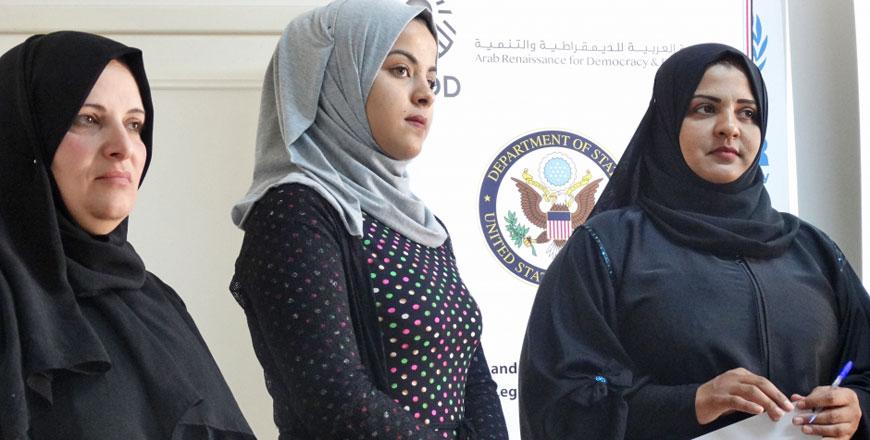You are here
National project empowers women against gender-based violence
By Ana V. Ibáñez Prieto - Sep 03,2018 - Last updated at Sep 03,2018

Some 300 Syrian and Jordanian women based in Amman, Zarqa and Irbid took part in the project (Photo courtesy of ARDD website)
AMMAN — The legal aid organisation, Arab Renaissance for Democracy and Development (ARDD) on Wednesday concluded its “Shurouq” project for the prevention and response to gender-based violence (GBV) through legal protection and civic engagement.
The project aimed at “illuminating women’s path towards a better life by empowering them in the fight against GBV in their communities”, according to its organisers.
Launched in April 2018 with the support of the US Department of State’s Bureau of Population, Refugees and Migration, “Shurouq” ("sunrise" in Arabic) benefitted a total of 300 Syrian and Jordanian women based in the host communities of Amman, Zarqa and Irbid who were over the age of 16 and considered "at risk of GBV".
Through sessions on legal awareness, psychosocial support and civic participation, the project led to the creation of a group of women who will continue to work as “change makers, leaders and role models within their communities”, according to a statement by ARDD.
“Initially, many of the participants lacked confidence in their ability to implement initiatives and foster change, but in the end, we found the opposite,” ARDD gender unit manager, Lana Zananiri, said during the project’s closing ceremony.
A total of 24 initiatives were developed and implemented by the participants over the course of the project, which targeted issues such as child marriage and sexual harassment on the streets and over social media.
The conclusion of the project was marked by a panel discussion on the mechanisms of civic engagement in response to GBV, where several participants shared the initiatives they developed and their aspirations for the future.
During the discussion, ARDD CEO Samar Muhareb expressed the organisation’s pride over the initiatives ideated by the participants, stressing that “ARDD is always working to empower women to involve them in the fight against GBV in their respective communities, and overcome the obstacles that might hinder their path towards a peaceful and just life”.
Samar Obaidat, a specialised trainer from the Talal Abu Ghazaleh Organisation, said she was “impressed by the creativity of women involved in the Shurouq project and their ability to identify the needs of the community”. She expressed her belief in "partnerships with civil society organisations as a means to reach common goals”.
“There are many causes leading to GBV and each one of them must be studied separately in order to reach a solution,” Senator Sawsan Al Majali said. “The issue of GBV is a national, regional and global issue, and it cannot be resolved unilaterally, as it requires cooperative and participatory work from official institutions, civil society organisations and the media.”
The senator pointed out that the studies and initiatives she has carried out through her work show that “economic violence, and especially women's deprivation of inheritance, is the most prevalent kind of GBV against women in Jordan. The husband, father or brother’s requisition of a woman’s salary is in the forefront of reasons that subdue her desire to work”.
Related Articles
AMMAN — The legal aid organisation Arab Renaissance for Democracy and Development (ARDD) on Sunday presented its 16 Days of Activism campaig
AMMAN — The Arab Renaissance for Democracy and Development (ARDD) - Legal Aid on Monday launched a toolkit to address gender-based violence
AMMAN — Under the theme “We hear your voice”, the 17th Arab Women Media Conference (AWMC) was held on Wednesday to discuss the challenges fa














